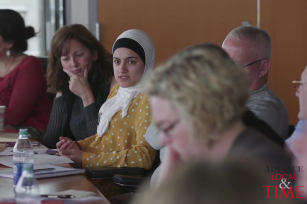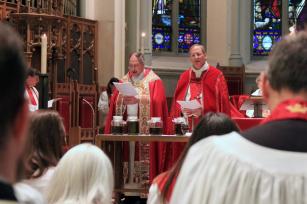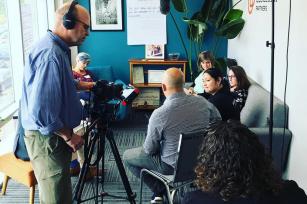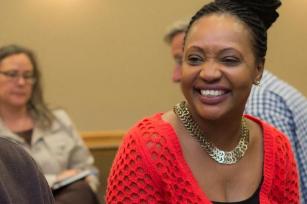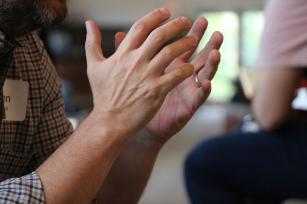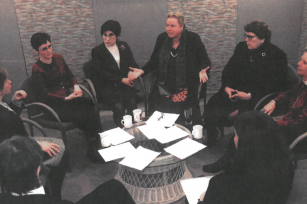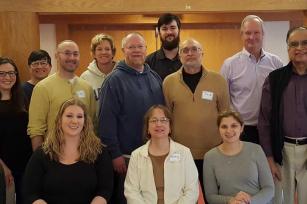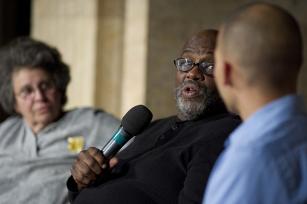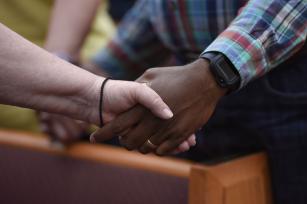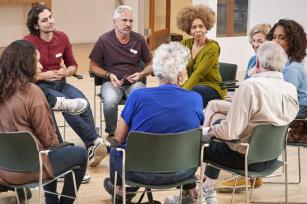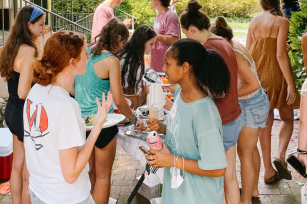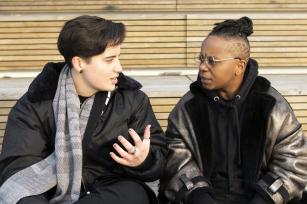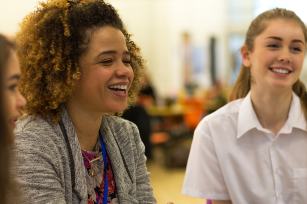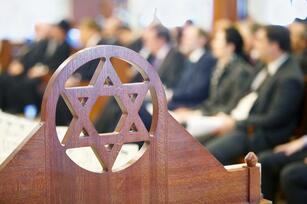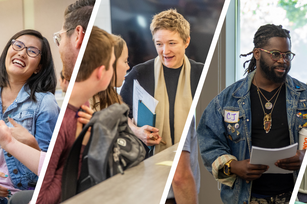
Breadcrumb
- Essential Partners
- Our Impact
- Impact Stories
- Same-Sex Marriage Ballot Measure in Minnesota
Same-Sex Marriage Ballot Measure in Minnesota
A state ballot initiative to limit marriage to one man and one woman created a contentious and heated election season in Minnesota. The 24 church bodies that comprise The Minnesota Council of Churches had different stands on the initiative. But the Council, which includes 3,000 congregations, didn’t want to stay silent on an issue that had enormous meaning for the state’s citizens.
The Bush Foundation provided funding to convene neutral conversations. Now, the Council had to figure out exactly how to create such conversations.
“We wanted to bring people together to build empathy and understand each other, but we couldn’t influence the vote. After looking at numerous methodologies, we chose Public Conversations. Unlike so many organizations that push consensus building, Public Conversations’ model fit perfectly with our aim to not influence the outcome of the election,” said Gail Anderson, who was at that time the Director of Unity and Relationships at Minnesota Council of Churches.
The Respectful Conversations Project
The Council created The Respectful Conversations Project—an initiative that would bring people together for community dialogues on same-sex marriage using Essential Partners model.
First, Essential Partners trained 15 people to be lead facilitators with a custom two-day workshop. Those lead facilitators, in turn, trained 200 to 300 people to be table facilitators.
Between April and November in 2012, 55 churches around the state held a Respectful Conversations event—a three-hour dialogue among small groups of people at round tables. Most of the conversations were open to the public. More than 1,500 residents participated. Respectful Conversations events were also held at universities, a national conference, and a quarterly meeting for pastors.
Each event started with a family-style meal and a few conversation starters unrelated to the amendment, which allowed participants to get to know one another outside of the contentious issue.
A video then highlighted key points about the amendment, different viewpoints, and guidelines around participation in the conversation. Using EP’s trademark Reflective Structured Dialogue model, participants shared responses to three carefully crafted questions before the floor was opened for questions of genuine interest.
Treating Each Other Humanely
“We became confident really early on that the model was working., said Anderson. “We were nervous there would be yelling and blow-ups but after a few conversations we realized that wasn’t happening… People were treating each other humanely.”
“[The questions of genuine interest was the] place we thought people would be forceful with their opinions and arguments,” she explained. “But [Essential Partners] told us to trust the power of human interaction; there had been two hours for people to build a human relationship. And, it worked!”
Anderson also remarked on the last impact of Essential Partners' capacity-building mission. “By training us in their model, Essential Partners has allowed us to create something for Minnesota that will have a long-lasting impact on the state and how we talk to each other and get along. Our objective was to convince the people of Minnesota that we can talk about divisive issues while maintaining—or even enhancing—our relationships with each other. And I’m absolutely confident we did that.”
On November 6, 2012, the ballot measure was rejected by 51.90% of voters.
Related Impact Stories
Testimonials

Program ParticipantI felt an amazing sense of accomplishment when the Essential Partners training ended; that I'd done something important for my community and something important for me.
Massachusetts

Paul Schupe, Hancock United Church of ChristIt’s amazing how closely we can work together on certain projects and never know what about our faith motivates our work. This work deepened my appreciation for everyone who was there; hearing everyone's stories helped me to appreciate them more and the depth of their convictions, even when they’re convictions I don’t share.
Lexington, Massachusetts

Cricket Fuller, The Christian Science MonitorThis wasn’t a policy debate [about guns]. Instead, two people whose backgrounds and views diverged in almost every way possible shared a moment of honesty that struck at the heart of the matter.
Boston, Massachusetts

Undergraduate StudentI have never heard people talk so openly about race, especially in a class setting. Everyone was respectful and honest at the same time. The dialogue structure helped me learn about my peers and helped me feel more comfortable than I ever have about discussing controversial issues.
Gordon College, Massachusetts

Program ParticipantBefore, I thought all dialogue that does not culminate in solution was considered equivalent to failure. Now I see that dialogue is a stage complete in itself.
Burundi

Seth Karamage, MediatorI am amazed at what came out—the way people shared their stories. This is not like a role-play; it really touched me.
Interfaith Mediation Centre, Nigeria

Bob Bordone, Expert and AuthorEssential Partners does the best work in the field of dialogue and communication.
Harvard Negotiation & Mediation Clinical Program, Co-Founder

Program ParticipantThis is the best adult learning experience I have had in the past five years. I wanted to learn new skills—I did!

Undergraduate StudentI notice that my classmates take much more care when speaking about people who practice other religions. They make fewer assumptions, and they’re more careful with their words to make sure to avoid unintentional connotations.
Bridgewater College, Virginia

Belle AbayaAuthentic conversations will lead people to reflect on their own thinking and transform their perspectives to include that of others.
The Conflict Resolution Group Foundation, Philippines

Imam Sani IsahThrough this training, we will have more people in the stream of work that we do and become better equipped with the know-how, skills and techniques. But most important, together we will sow a seed that will germinate and become a source of the antidote to terrorism, fanaticism, bigotry and extremism.
Nigeria

Cricket Fuller, The Christian Science MonitorThis wasn’t a policy debate [about guns]. Instead, two people whose backgrounds and views diverged in almost every way possible shared a moment of honesty that struck at the heart of the matter.
Boston, Massachusetts

Seth Karamage, MediatorI am amazed at what came out—the way people shared their stories. This is not like a role-play; it really touched me.
Interfaith Mediation Centre, Nigeria

Undergraduate StudentI notice that my classmates take much more care when speaking about people who practice other religions. They make fewer assumptions, and they’re more careful with their words to make sure to avoid unintentional connotations.
Bridgewater College, Virginia

Program ParticipantI read this comment from the 14th Dalai Lama: "Every change of mind is first of all a change of heart.” It seems appropriate for what we are doing.
Bayview, Michigan
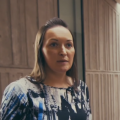
Louise O’Kane, Community Places[Essential Partners’] technique is used to explore contentious or divisive issues. So looking at renewable energy we thought this was an ideal opportunity to explore all the complexities of that issue. I found it a really useful method, and although this is the first time we’ve used it I am sure we’ll be using it again.
Northern Ireland, UK

Program ParticipantI did not anticipate having as many concrete takeaways as I do. I feel there is an immense practical application.

Program ParticipantThere should be opportunities throughout the [Anglican] Communion for ongoing structured conversations regarding difficult issues. These should engage persons at all levels within and between Provinces and should be guided by agreed covenants similar to those that have assisted our conversations.
Anglican Community & Human Sexuality Retreat

Program ParticipantThe highlight for me was the interconnectedness of the participants’ views, mutual respect, and range of experiences within the group
Montana

Kate CellThe thing that always feels like magic to me—and I’ve used it in several meetings that I’ve had since—is how the practitioners start by setting out pacts or agreements.
Union of Concerned Scientists, Massachusetts

Program ParticipantI did not anticipate having as many concrete takeaways as I do. I feel there is an immense practical application.

Sepi Djavaheri, Community Mobilizers Director“The Essential Partners training has had a multiplier effect—not only did it enrich the Dialogue Across Faiths event itself, but it also equipped a cadre of local leaders with effective tools to lead ongoing, constructive conversations within and between their congregations.”
UJA-Federation of New York

Imam Sani IsahThrough this training, we will have more people in the stream of work that we do and become better equipped with the know-how, skills and techniques. But most important, together we will sow a seed that will germinate and become a source of the antidote to terrorism, fanaticism, bigotry and extremism.
Nigeria

Member of the CongregationI cannot possibly walk out of this experience and help being a different person. I feel that my own experience has been life-changing.
Glendale Presbyterian, California

Andrew Wulf, PrincipalThe community dialogue was instrumental in helping us create a new policy around class rank. Though a controversial topic in the community, the dialogue EP helped us run ensured all voices were heard and valued. Regardless of how people felt with the final result, one parent summed it up best for us, ‘sometimes the process is more important than the outcome’.
Newburyport High School

Program ParticipantThis is a new idea, so many people speaking from their hearts. People can come together...if people can understand, they can change their hearts; then this can bring about more change.
Interfaith Mediation Centre, Nigeria

Douglas Stone, Sheila Heen, and Bruce PattonWe owe a debt of gratitude to Laura Chasin and her collaborators at Essential Partners… From them, we have learned about the transformative power of telling one’s story and speaking to the heart of the matter.
Difficult Conversations

Janele Nelson, Mission DirectorIn these divisive times, Essential Partners has given my local YMCA and now the national YMCA a means to build bridges through dialogue, re-establishing foundations for constructive change to occur.
YMCA of Pierce & Kitsap Counties (WA)

Misty Stoll, School Board TrusteeThe Sheridan Community has changed in the best way since the Essential Partners training. The Center for a Vital Community has been holding monthly dialogues. I’m going to facilitate the upcoming one. What’s great is that we’re attracting a much more diverse group of participants. There are always the regulars who come, but now we’re also getting conservative Republicans to come as well—politicians come, even the Sheriff comes.
Wyoming

Program ParticipantThe highlight for me was the interconnectedness of the participants’ views, mutual respect, and range of experiences within the group
Montana

Peter Cooke, Immigration Dialogue ParticipantThere’s a real difference to people who are coming to meetings. They say, wow this is so different. They all said how people were more on the ball, more congenial. Now people see growing the economy as a way to unify the receiving community and immigrant communities.
New Hampshire

Rebekah Shrestha, SVPEssential Partners has played a catalytic role in our ability to facilitate dialogue time and time again, and we could not have done this work without them.
Belfer Center for Innovation & Social Impact and Office of Strategic Planning, 92NY

Program ParticipantI read this comment from the 14th Dalai Lama: "Every change of mind is first of all a change of heart.” It seems appropriate for what we are doing.
Bayview, Michigan

Lauren Cobb, Task Force MemberI now lead teams with a different language, using different processes, and with a different awareness of team dynamics. [I’ve seen] relationships grow and deepen, unity and commitment remain high, and mutual respect established and fostered.
Glendale Presbyterian Church, California

Bill Scott, Project DirectorThere was a remarkable change in the way we were able to communicate with one another following the facilitated conversations.
Massachusetts Department of Mental Health

Synagogue Congregant“After Octover 7th, I used the Essential Partners Guide to Dialogues About Israel and Palestine to design the dialogue and develop prompts. I deployed the training I received from Essential Partners to lead a Reflective Structured Dialogue where participants could share stories, encourage curiosity, and approach one another with tenderness. … The dialogue programs at our synagogue were a resounding success. Members still hold very different perspectives, but those who disagree, even vehemently, have been able to maintain relationships. Those whose views fall between the extremes feel more able to share their perspectives. They see one another as members of a shared community once again.”

Program ParticipantWhile our differences remain, the relationships between us have been strengthened and deepened. We have gained in mutual respect, affection, and appreciation of one another as followers of Jesus and fellow-bishops.
Anglican Community & Human Sexuality Retreat

Misty Stoll, School Board TrusteeI ran for my local school board in 2018 and was elected. I use the skills in our meetings, whether I’m chairing the meeting or not. This makes the meetings much more productive. We don’t go over the same topics over and over again.
Wyoming

Bob Bordone, Expert and AuthorEssential Partners does the best work in the field of dialogue and communication.
Harvard Negotiation & Mediation Clinical Program, Co-Founder

Program ParticipantThis is a different tool for engagement. It’s not about you, it’s about others. It involves the art of listening and sincerely talking from the heart
Interfaith Mediation Centre, Nigeria

Program ParticipantThis is a different tool for engagement. It’s not about you, it’s about others. It involves the art of listening and sincerely talking from the heart
Interfaith Mediation Centre, Nigeria

Veronique Cavaillier, Director of Eastern Trade CouncilI think Essential Partners' training should be mandatory in every legislature. I think it should be a requirement.
The Council of State Governments

Janet Harris, Winthrop Rockefeller InstituteThe learning we received from Essential Partners has helped us open up space for people to have difficult conversations in a different way. The more we do this, the more we realize that dialogue has to be a part of all our work.
Arkansas

Program ParticipantThis is a new idea, so many people speaking from their hearts. People can come together...if people can understand, they can change their hearts; then this can bring about more change.
Interfaith Mediation Centre, Nigeria

Program ParticipantI am now open to new views and can moderate my impulse to debate or persuade others of different views
Montana

Windor DorkoAs a former rebel, I really believe that if we had known about dialogue, perhaps we would not have had a civil war.
Liberia

Etionette Nshirmirimana, Burundian Master TrainerI realized that by using the “dialogue” approach, people could talk of what is deep in their heart, especially things that have harmed them.
Burundi

Matthew Sandikie, Project PartnerThis has been quite different from other discussions in Liberia about peace. While many processes have been about how to reform ex-combatants, this was about how we may hold our own views but live together peacefully.
Liberia

Janele Nelson, Mission DirectorIn these divisive times, Essential Partners has given my local YMCA and now the national YMCA a means to build bridges through dialogue, re-establishing foundations for constructive change to occur.
YMCA of Pierce & Kitsap Counties (WA)

Rebekah Shrestha, SVPEssential Partners has played a catalytic role in our ability to facilitate dialogue time and time again, and we could not have done this work without them.
Belfer Center for Innovation & Social Impact and Office of Strategic Planning, 92NY

Program ParticipantI am now open to new views and can moderate my impulse to debate or persuade others of different views
Montana

Romeo McCauley, Project PartnerI learned that I can build relationships, that I can be connected to anybody who I want to be connected to, no matter how difficult it is
Liberia

Nicki Glasser, Policy CoordinatorWhat surprised me was how much you could transform a relationship during a three-hour conversation.
Transformation Center, Massachusetts

Anjali Bal, Associate Professor of MarketingOne of the things that we talked about was the ability to hear another person’s point of view, even if our minds aren’t changed. We have to remember that any sort of movement is movement. If we don’t acknowledge small movement, then we just stay on two different sides, and it’s all black and white, and we don’t hear each other.
Babson College, MA

Belle AbayaWhat is special about Essential Partners' approach is that it promotes authenticity, reduces defensiveness, increases curiosity, and boosts connectedness.
The Conflict Resolution Group Foundation, Philippines

Gail AndersonWe became confident really early on that the model was working. We were nervous there would be yelling and blow-ups but after a few conversations we realized that wasn’t happening… People were treating each other humanely.
Minnesota Council of Churches

Kim Davidson, OmbudsI’ve gained not only confidence but tools. The Essential Partners training was worth every penny.
Oberlin College, Ohio

Megan DeFranzaThere is a need not only for safe space within our churches but for our church leaders who often feel alone, or who may feel their job could be at risk if they engage in controversial conversations. How are they to make safe spaces in their own congregations for healthy dialogue if they rarely experience safe space to do the same?
Gordon College, Massachusetts

Meirav Solomon ’20Dialogue not only teaches you how to interact and understand more deeply those around you, it also teaches you more about the world around you and yourself. I think dialogue is super important to my growth as a student, a global citizen and a human being. I have learned to listen, I have learned to speak out, I have learned how to access my stretch zone (where I feel uncomfortable speaking but not turned off) and I have learned where my limits are.
Cary Academy, NC

Linda Gryczan, MediatorInstead of demonizing and dehumanizing the other, we built a deeper connection. The fact that we disagree matters much less. It matters much more that we are neighbors in this community.
Montana Mediation Association

Program ParticipantThis is the best adult learning experience I have had in the past five years. I wanted to learn new skills—I did!

Program ParticipantI felt an amazing sense of accomplishment when the Essential Partners training ended; that I'd done something important for my community and something important for me.
Massachusetts

Belle AbayaTogether, we married our ideas to create a dialogue model that took into consideration our young people’s particular needs, and our culture.
The Conflict Resolution Group Foundation, Philippines

Linda Gryczan, MediatorInstead of demonizing and dehumanizing the other, we built a deeper connection. The fact that we disagree matters much less. It matters much more that we are neighbors in this community.
Montana Mediation Association

Megan DeFranzaHere safe space was created for pastors and church leaders to wrestle with topics like evolution which are all too often “off limits” or believed to be antagonistic to the faith.
Gordon College, Massachusetts

Kim Davidson, OmbudsI’ve gained not only confidence but tools. The Essential Partners training was worth every penny.
Oberlin College, Ohio

Nicki Glasser, Policy CoordinatorWhat surprised me was how much you could transform a relationship during a three-hour conversation.
Transformation Center, Massachusetts
